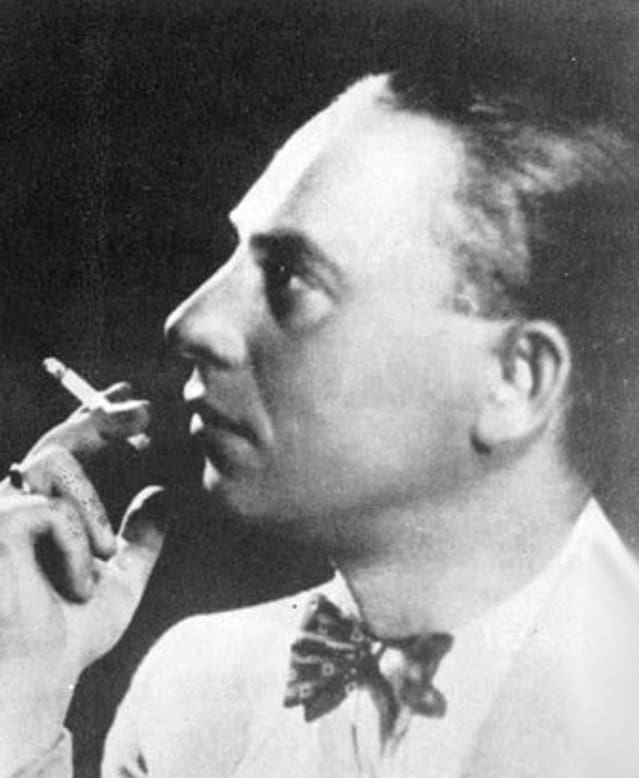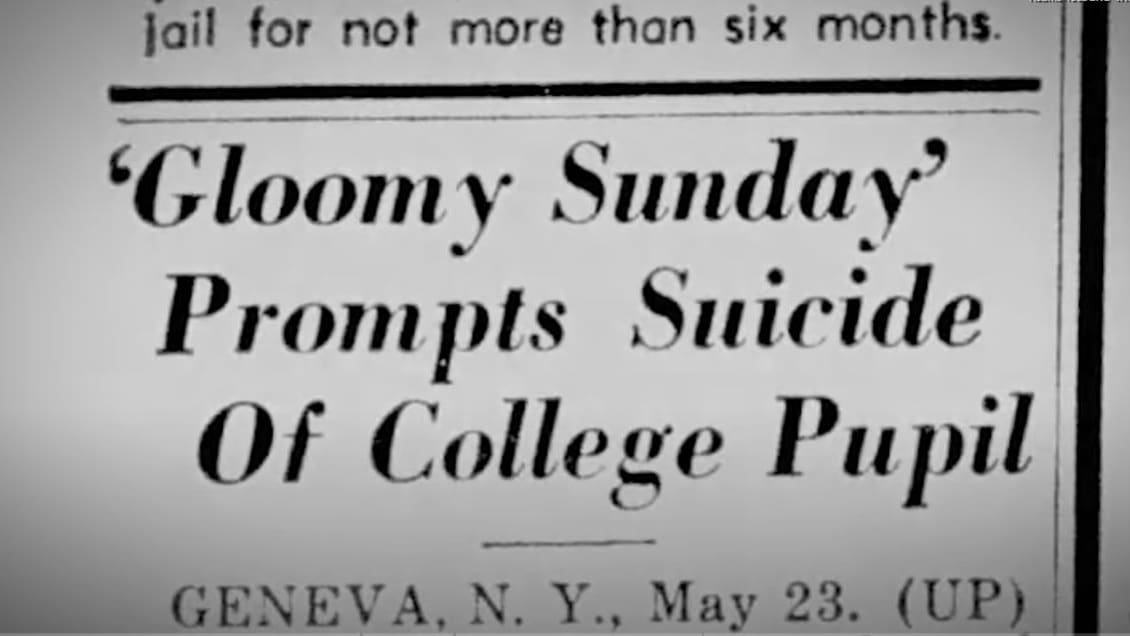Gloomy Sunday, also known as The Hungarian Suicide Song, may be one of the most infamous pieces of music ever written. According to the urban legend, listening to it would trigger suicides for many people. How much of it is true from that?
What is 100 per cent confirmed is that the British public broadcaster BBC banned it until 2002. We also know that contemporary press reported on the multiple cases of suicide allegedly linked to the song. Also, in 2007, an entire scientific research paper was published in the peer-reviewed journal OMEGA – Journal of Death and Dying.
Before we get to all that, let’s take a look at the life and career of the composer of the infamously eerie song, the man named Rezső Seress, who happened to have been born exactly 124 years ago, on 3 November 1899.
The Life of Rezső Seress
Seress grew up in Komárom, Austria-Hungary (today’s Komárno, Slovakia). He dropped out of secondary school in his early teens to join a travelling circus troupe as an acrobat performer. However, he ended up falling from a great height after an accident during rehearsal. Miraculously, he survived the incident, but had to look for a different profession.
After meeting and befriending actor Tivadar Bilicsi, Seress too decided to become an actor himself. While working as a thespian in a small Budapest theatre troupe struggling to make ends meet, he taught himself how to play the piano in his spare time on a piano backstage. He soon started to compose his own music, some of which impressed the theatre director who ended up staging his show as a pianist.
Seress’ first original song to garner national recognition was Még egy éjszaka (One More Night) from 1925, right at the time when music record sales started to take off in Hungary.
His song ended up selling 17,000 copies. He soon followed it up with another, even bigger hit, Ki volt az az asszony, kinek szíve (Who Was The Woman Whose Heart).
After about a decade of success, the Great Depression hit Hungary as well. This, coupled with the fact that the new popularity of sound film prevented him from getting gigs accompanying silent pictures, led to serious financial woes for Seress—who, by the way, had recently gotten married to Helénke Jászonyiné, who had left her military officer husband for him.
Seress decided to compose the music for the poem Szomorú vasárnap (Gloomy Sunday) by László Jávor, while trying to make it as a songwriter in Paris, France in late 1932.
The piece was eventually published in 1933, at a time when, in addition to the economic depression, the rise of fascism across Europe also filled the public atmosphere with unease.
The lyrics themselves are about a man in despair, longing for his old lover, waiting for her to come back every Sunday with white roses and prayers. Although it is not explicitly stated, the words also suggest that his lover had passed away. Here’s an English translation of the lyrics:
‘Sunday is gloomy,
My hours are slumberless.
Dearest, the shadows
I live with are numberless.
Little white flowers
Will never awaken you.
Not where the black coach
Of sorrow has taken you.
Angels have no thought
Of ever returning you.
Would they be angry
If I thought of joining you?
Gloomy Sunday
Gloomy is Sunday,
With shadows I spend it all.
My heart and I, have
Decided to end it all.
Soon there’ll be candles
And prayers that are said, I know.
Let them not weep,
Let them know that I’m glad to go.
Death is no dream,
For in death I’m caressing you.
With the last breath of my soul,
I’ll be blessing you.
Gloomy Sunday
Dreaming, I was only dreaming.
I wake and I find you asleep
In the deep of my heart, dear.
Darling, I hope that
My dream never haunted you.
My heart is telling you,
How much I wanted you.’
The song attracted little attention upon its release, sending its composer Seress into even deeper despair. However, Pál Kalmár, one of the most celebrated Hungarian singers at the time, decided to include the song in his shows, and even recorded a rendition of it. The song’s popularity did not last long, however. As early as 1935, the local Hungarian press started to link it to suicides: one of a housekeeper, who drank sodium hydroxide while holding the sheet music of the song; and another one of a consultant for the Ministry of Finance, who shot himself in the head with a handgun in a cab, and quoted the song’s lyrics in his suicide note.
Seress Rezső – Szomorú vasárnap * Gloomy Sunday – The Hungarian Suicide Song
Ének: Kalmár Pál. SERES REZSŐ Az egyik leghíresebb örökzöld dal, magyar világsláger, a Szomorú vasárnap (Gloomy Sunday) szerzője (szöveg: Jávor László, a 8 Órai Újság bűnügyi riportere). A dalt több mint 100 nyelvre fordították le. SERESS REZSŐRŐL: Bodrogi Gyula: “… nekem azt mondták, menjek el a Kispipába, mert van ott egy óriási, zseniális zongorista.
Some of the press attacked Seress for his creation. The legend of ‘the Hungarian Suicide Song’ was picked up by newspapers outside of Hungary as well, in places like Switzerland, Italy, France, and Germany.
Despite his Jewish ancestry, Seress was conscripted into the Hungarian Army to serve in World War II. He did not see combat action, he was digging ditches and demining fields during his time of service. However, his mother was deported and died in a Jewish labour camp.
During the time of war, Seress wrote alternative lyrics to the melody of his fabled Gloomy Sunday song, with the title The World Has Ended.
While he was away from home serving in the army, his wife left him for another man. However, she later ended that relationship and returned to Seress who forgave her.
The post-war Communist period in Hungary was not easy for Seress. His songs were blacklisted, so he had to struggle paycheck to paycheck, through odd gigs as a pianist.
In 1968, at age 68, the man best known for writing The Hungarian Suicide Song, took his own life himself.
He first jumped off the balcony of his Budapest apartment, but survived the fall. In the hospital, he strangled himself to death with a loose wire.
Did Gloomy Sunday Really Cause a Suicide Epidemic?
From almost a century away, it would be hard to verify any individual cases of suicide being directly caused by Seress’ song. The composer even disputed the validity of the media reports of the housekeeper taking her own life because of it at the time, claiming that only a few copies of the sheet music were printed and it would have been really hard for a simple worker to get her hands on one.

As the paper in the OMEGA – Journal of Death and Dying points out, there was a major increase in suicides in the 1930s across the world due to the Great Depression. Most likely, people who were already desperate and deeply depressed were drawn to the message and solemn melody of the song, and it was not the song that made them suicidal. Furthermore, they write that there is no evidence that any piece of art can have a scientifically significant correlation to increased suicide rates—they believe further research is needed into that matter.
However, what is undeniable is that Gloomy Sunday has left a very unique, but also very dark legacy behind, that sparked many renditions over the decades, most notably one by American jazz singer Billie Holiday in 1941.
Related articles:








